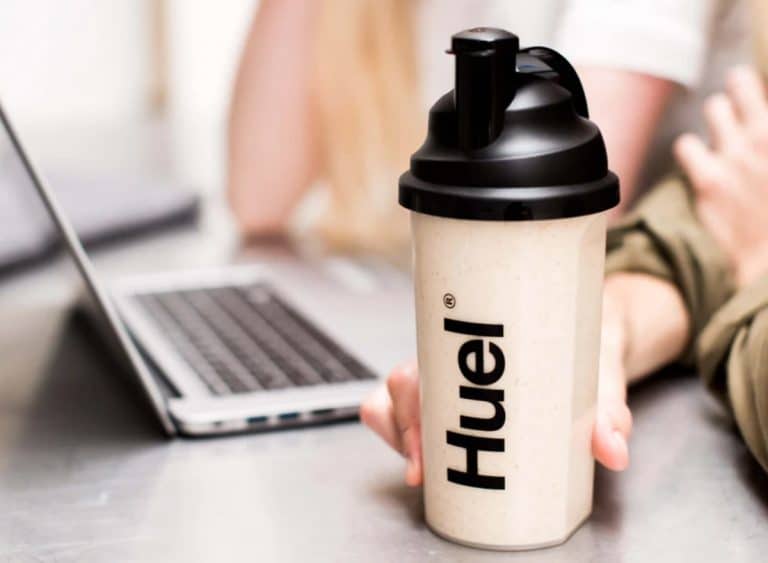Are meal replacements like Huel good for you?

Meal replacements hop from one hype to another by tapping into one body-image conscious person after another. Not only are they aimed at the weight, fitness and muscle-obsessed, but they target the ‘food is fuel and fuel only’ market. The supplement company Huel, co-founded by Julian Hearn, sums up the meal replacements’ main goal: for too long we have optimised food for taste instead of its primary purpose, namely to provide all the nutrition your body needs. “As a population we have made food so delicious that we crave it, get addicted to it, and over-consume it,” Hearn explains in an interview with Wired. This is arguably very true, but to push these facts aside, by strategising our lives for peak performance, are we then not simply jumping from one obsession to another?
Food is, and also is not, a problem that humanity has solved already. This problem is situation dependent. The increase of choice in western societies has led many astray from having an interest in food and what vitally important role food actually plays in our lives, our functional lives at that. After all, we cannot live without it.
Huel does in this sense solve this problem by meeting nutritional requirements, however, the act of creating, caring for and sharing food has proven to be just as important in how our bodies react and digest food in the first place.
Huel was founded in 2014 in Aylesbury, UK. In 2018, the company sold over 20 million meals in more than 80 countries. It claims itself to be a meal that has just the right amount of protein, essential fats, carbohydrates, vitamins and minerals, and it says is approved by registered nutritionists, but is it recommended? A product can easily meet nutritional requirements, add a little this, a little that and Bob’s your uncle you have yourself a complete, boxes-ticked meal. Add in a few E numbers to increase your product’s shelf life, make it vegan, lactose-free and you’re ready to go.
Huel powder is created along the lines of a set ratio of 37:30:30:3; in other words, 37 per cent of the energy in the drinks comes from carbohydrates, 30 per cent from fats, 30 per cent from proteins and 3 per cent from fibre. This is if you mix it in with water.
The thing with nutritional powders, that may or may not consist of real foods like Huel, is that forming a powder relies on a heavy dose of food processing. In terms of marketing, we have been led to believe that lean protein combats obesity, and carbohydrates have been commonly shamed into the cause of weight gain. A lot of gym-goers slurp up protein shakes sweetened (even ‘sweetened naturally’ has fine print) to taste of indulgent carbohydrate and sugar rich puddings such as salted caramel or chocolate brownie, all tastes that we usually avoid at all costs when thinking of what harm the real food will do to our bodies visually. In comes an unhealthy relationship with ‘real’ food, and triggered binges on what we deprive ourselves from that at the end of the day, when eaten in moderation and good temper, make us feel mentally happy.
With that in mind, the majority of meal replacement powders are packed with protein. Some even with a solid 30 grams per shake—our daily recommended intake is around 45 to 55 grams per day! What drinkable food as well as the western world’s diet then tends to lack, is fiber. From a nutritional perspective, fiber is a carb. It’s what we would refer to as a complex carbohydrate.
If you take multiple sugar molecules and link them together, you would get fiber. However, this doesn’t mean that it behaves like sugar. In fact, it doesn’t. Digestion of refined sugar (like sweets) starts in the mouth and in about twenty minutes it’s already been absorbed in the small intestine. Meanwhile, fiber remains unblemished as it passes through your mouth, stomach, and even fifteen to twenty feet of small intestine so that by the time it reaches your colon, it’s the same molecule that went in your mouth. Your body has taken the energy that it needs from the food and excretes its carrier, the high fibrous food.
When it comes to drinkable meal supplements, our bodies are accustomed to chew and process our food, so drinking it out of convenience leaves many unfulfilled having missed a key element of physically eating a meal, and our minds crave more. This being said, Huel as a product combats the issue of time, so as a short term conclusion, there are benefits. As a reliant, there are more cons than pros.
It could be said that instead of creating a society whereby fundamental practices of being human revolve around our busy schedules, it should be reversed to revolve around our practices. Life goes by faster when we work too much, and wouldn’t we want it to slow down?




